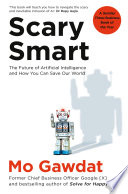

In 'Scary Smart,' the author emphasizes the rapid advancement of artificial intelligence (AI) and its potential to reshape society. As AI systems become increasingly sophisticated, they are not only performing tasks traditionally reserved for humans but also making decisions that can significantly impact our lives. The book discusses the dual nature of AI: while it can enhance efficiency and productivity, it also poses ethical dilemmas and risks. The author warns that as AI continues to evolve, it will require a reevaluation of our values, privacy, and the essence of what it means to be human. The implications of AI extend beyond technology; they touch on social structures, economic systems, and individual identity, urging readers to critically assess the trajectory of AI development and its integration into daily life.
Continue readingOne of the central themes in 'Scary Smart' is the necessity of collaboration between humans and AI. The author argues that rather than viewing AI as a replacement for human labor, we should see it as a tool that can augment our capabilities. This collaboration can lead to innovative solutions and improved outcomes across various sectors, from healthcare to education. The book illustrates how humans can leverage AI's analytical power while infusing emotional intelligence and ethical considerations into decision-making processes. By fostering a symbiotic relationship with AI, we can harness its strengths while mitigating potential downsides, emphasizing the importance of adaptability and continuous learning in an AI-driven world.
Continue readingThe book delves into the ethical considerations surrounding AI development, highlighting the responsibility of technologists, policymakers, and society at large. As AI systems are trained on vast datasets, biases inherent in these datasets can perpetuate discrimination and inequality. The author stresses the importance of ethical frameworks and guidelines to ensure that AI technologies are developed and deployed responsibly. This includes transparency in AI algorithms, accountability for decisions made by AI systems, and mechanisms for redress in cases of harm. By prioritizing ethical considerations, we can build trust in AI technologies and ensure they serve the greater good.
Continue readingIn 'Scary Smart,' the author advocates for a transformative approach to education in response to the rise of AI. Traditional educational models may not adequately prepare individuals for a future where AI plays a central role in various industries. The author calls for an emphasis on critical thinking, creativity, and emotional intelligence—skills that are uniquely human and cannot be easily replicated by machines. By redefining educational curricula to focus on these competencies, we can equip future generations with the tools needed to thrive in an AI-driven landscape. The book highlights innovative educational initiatives and the importance of lifelong learning in adapting to the changing demands of the workforce.
Continue readingThe author emphasizes the necessity of global cooperation in addressing the challenges and opportunities presented by AI. As AI technologies transcend national borders, it is crucial for countries to collaborate on regulatory frameworks, ethical standards, and best practices. The book discusses the potential for international agreements to govern AI development and deployment, ensuring that advancements benefit humanity as a whole rather than exacerbating existing inequalities. By fostering dialogue and cooperation among nations, we can create a more equitable and sustainable future in the age of AI.
Continue readingThe book encourages individuals to take personal responsibility for their interactions with AI technologies. As consumers and users of AI, we play a crucial role in shaping its development and impact. The author suggests that we should be informed and critical users of AI, advocating for transparency and ethical practices from companies and developers. This personal accountability extends to our engagement with social media and digital platforms, where AI algorithms influence our perceptions and behaviors. By cultivating a mindful relationship with technology, we can contribute to a more positive and responsible AI ecosystem.
Continue readingFinally, 'Scary Smart' explores the future of work in an economy increasingly influenced by AI. The author posits that while certain jobs may become obsolete due to automation, new opportunities will arise that require human skills and creativity. The book discusses the importance of adaptability and resilience in navigating this transition, emphasizing the need for workers to continuously upskill and embrace change. By understanding the evolving landscape of work, individuals can position themselves to thrive in an AI-driven economy, leveraging their unique strengths to complement AI technologies.
Continue readingThe reading time for Scary Smart depends on the reader's pace. However, this concise book summary covers the 7 key ideas from Scary Smart, allowing you to quickly understand the main concepts, insights, and practical applications in around 26 min.
Scary Smart is definitely worth reading. The book covers essential topics including The Rise of AI and Its Implications, Human-AI Collaboration, Ethics and Responsibility in AI Development, providing practical insights and actionable advice. Whether you read the full book or our concise summary, Scary Smart delivers valuable knowledge that can help you improve your understanding and apply these concepts in your personal or professional life.
Scary Smart was written by Mo Gawdat.
If you enjoyed Scary Smart by Mo Gawdat and want to explore similar topics or deepen your understanding, we highly recommend these related book summaries:
These books cover related themes, complementary concepts, and will help you build upon the knowledge gained from Scary Smart. Each of these summaries provides concise insights that can further enhance your understanding and practical application of the ideas presented in Scary Smart.